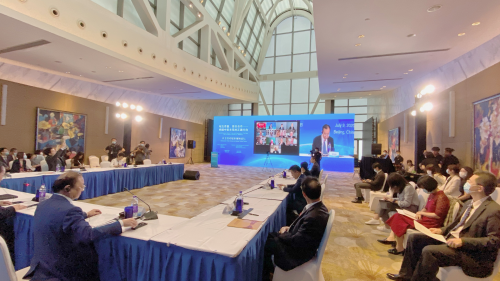On July 9, China Public Diplomacy Association, Peking University and Renmin University of China jointly organized the China-US Think Tanks Media Forum under the theme of “Keep the Right Direction of the Sino-U.S. Relations through Mutual Respect, Trust and Cooperation”. State Councilor and Foreign Minister Wang Yi delivered a speech (the full text will be published separately). Former U.S. Secretary of State, H.E. Henry Alfred Kissinger also delivered a speech. H.E. Kevin Rudd, former Prime Minister of Australia and President of Asia Society Policy Institute, H.E. Zhao Qizheng, former Director of the State Council Information Office of the People's Republic of China, H.E. Kurt Campbell, former U.S. Assistant Secretary of State for East Asian and Pacific Affairs, and H.E. Fu Ying, former Vice Minister of Foreign Affairs of the People's Republic of China delivered keynote speeches. Guests from both sides conducted in-depth discussions on the status quo, problems and challenges of China-US relations and put forward some constructive suggestions on future China-US cooperation. Wu Hailong, President of China Public Diplomacy Association, presided over the opening ceremony and made a concluding speech.
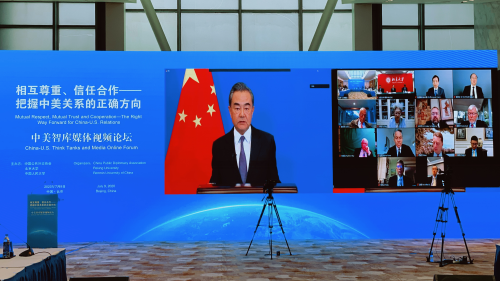
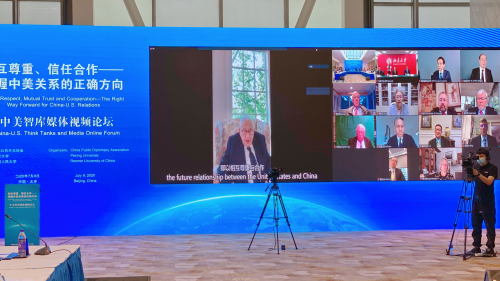
H.E. Kevin Rudd said that the current strategic competition between the United States and China has entered a new stage. Both sides must find a sustainable future for development, create a new framework and use new rules to guide the US-China relationship, so as to better manage differences and promote strategic communication between both sides. We must have a clear understanding of each other's red lines and truly understand the core interests of both sides. The U.S.-China relationship is facing many challenges. To advance the bilateral relationship, it is necessary to find the key points of the problem, otherwise it will be difficult to promote the U.S.-China relationship.
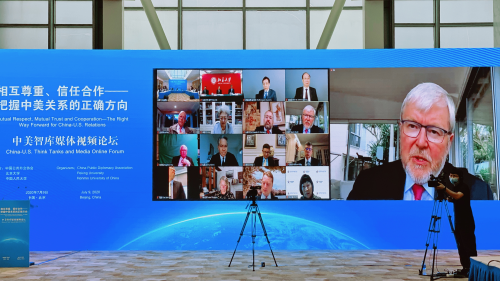
H.E. Zhao Qizheng said that China and the United States need to grasp the direction of historical development, especially to manage hostile factors in their bilateral relations. China has not challenged American values and national security. China does not want to participate in a new Cold War. Both China and the United States need to promote their own economic and social development in a peaceful and stable environment. As long as China and the United States adhere to win-win cooperation and reduce confrontation, the two countries will definitely be able to surmount the "Thucydides trap."
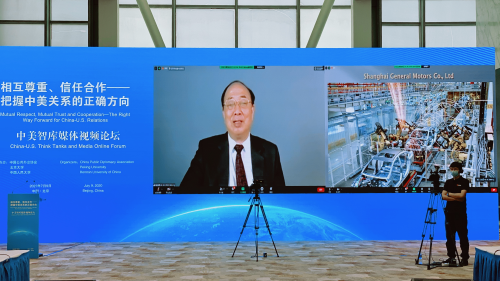
H.E. Kurt Campbell said that the current competitive factors in US-China relations have been over-concerned, so the two sides should strengthen cooperation and balance the factors of bilateral competition. The two sides should carry out in-depth strategic dialogues. First, explore pragmatic cooperation in some small areas, and establish communication and crisis management mechanisms in sensitive areas such as the military. The two sides should maintain and expand cultural exchanges, including exchanges between youths.
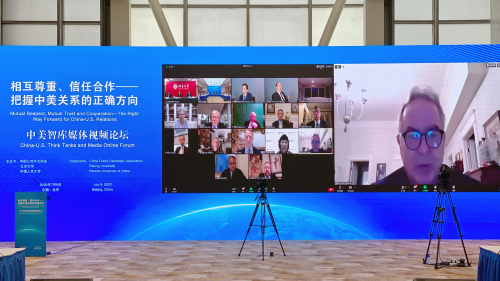
H.E. Fu Ying said that China needs to carefully design the future development of China-US relations. China can take the initiative to promote frank dialogue in key areas, truly listen to each other and effectively address reasonable concerns. Both parties need to deepen their understanding, reach consensus on the boundaries and bottom lines for actions and make necessary control over irreconcilable differences of interest. It is necessary to improve and enhance China's international image and let the world know more about China's real situation and Chinese people's opinions. China and the United States are facing their own problems and challenges. Solving their own problems well and actively cooperating to help the world at the same time is what the two countries should be supposed to do.
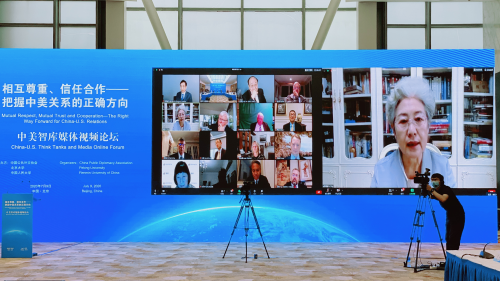
In his concluding remarks, President Wu Hailong said that most of the guests attending the meeting are those who have witnessed, experienced and promoted China-US relations and they all have made important contributions to China-US relations. The two sides expounded their views on the development of Sino-US relations from different angles and put forward many constructive suggestions. Everyone agreed that China and the United States need cooperation rather than confrontation, and cooperation is the only best option. China and the United States should jointly explore ways of peaceful coexistence and win-win cooperation. Everyone also agreed that China and the United States must effectively manage their divergences, respect each other's core interest and major concerns and avoid confrontation and division in Sino-US relations. China and the United States should strengthen dialogue and exchanges. Only dialogue and communication can reduce misjudgment, enhance mutual cognition and comprehension and improve mutual understanding and trust.
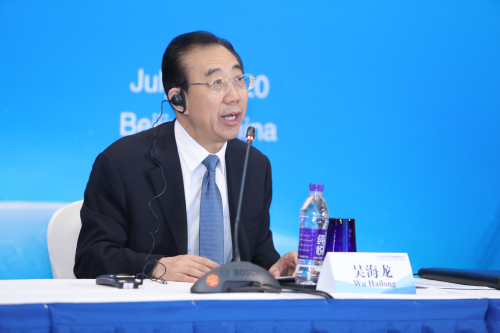
President Wu also pointed out that, 49 years ago today, Dr. Kissinger embarked on an icebreaking journey for Sino-US relations. Today our generation should be wiser, more determined and more courageous to solve the current difficulties and crises which China-US relations face. He hopes that far-sighted personages from China and the United States will work together to make new contributions to bring the current Sino-US relations back to the right track. The ultimate improvement of Sino-US relations is what the people want and the irreversible trend, and we are full of confidence in this.
The Chinese guests attending the forum include: H.E. Hao Ping,President of Peking University, H.E. Wei Jianguo, former Vice Minister of Commerce of the People's Republic of China, H.E. Zhou Mingwei, former President of China Foreign Languages Publishing Administration, H.E. Huang Huikang, former Chinese Ambassador to Malaysia, Ruan Zongze, Vice President of China Institute of International Studies, Wang Wen, Executive Dean of Chongyang Institute for Financial Studies at Renmin University of China, Wang Dong, Executive Director of Institute for Global Cooperation and Understanding at Peking University, Liu Lina,Xinhua News Agency International Affairs Correspondent, Liu Xin, CGTN Anchor, Wang Guan, CGTN Journalist and Jin Zhongwei, Editor-in-chief of Guancha Syndicate.
American guests include H.E. Susan Thornton, former Acting U.S. Assistant Secretary of State for East Asian and Pacific Affairs, H.E. Julia Chang Bloch,former U.S. Ambassor to Nepal and the President of the U.S.-China Education Trust, H.E. J. Stapleton Roy,former U.S. Ambassador to China, Ryan Hass, former Director of China Affairs at the U.S National Security Council, Stephen A. Orlins,President of U.S. National Committee on U.S.-China Relations, Li Cheng,Director of Brookings Institution China Center, Joshua Cooper Ramo,Vice Chairman and Co-executive of Kissinger Associates, Inc, W.C. Kirby, Director of the Harvard China Fund and former Director of Fairbank Center for Chinese Studies, Brendan S. Mulvane, Director of China Aerospace Studies Institute at U.S. National Defense University, Yue John Liu, Executive Editor for Greater China of Bloomberg News, Ericson Baculinao,NBC Beijing Bureau Chief, Steven Jiang, CNN Beijing Bureau Chief and Eunice Jaiwon Yoon, CNBC Beijing Bureau Chief.
